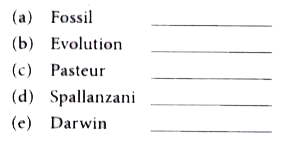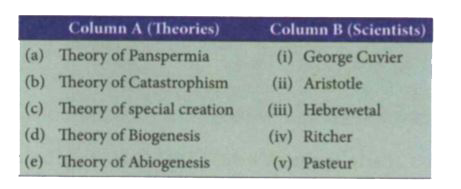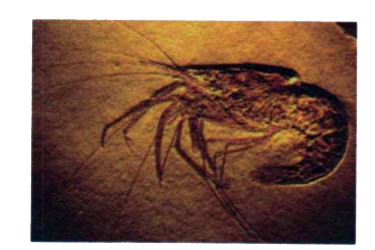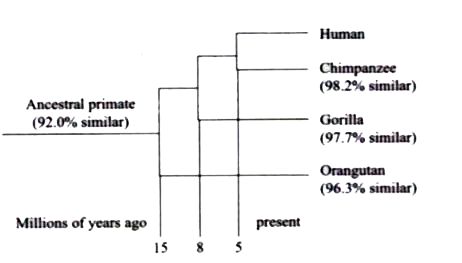Complete Solutions to MANDATORY EXERCISE of chapter EVOLUTION of Class 10 book with complete answers and questions
| Class 10 | BIOLOGY |
| Chapter | EVOLUTION |
| CENGAGE BIOLOGY | MANDATORY EXERCISE |
| Number Of Questions | 29 |
| Academic Year | 2023-24 |
Define biogenesis.
View SolutionDefine speciation.
View SolutionWhich statement best describes evolution?
View SolutionGiven below are the following terms (letters) with their appropriate definition numbered items).

(i) Boiled broth experiment gave rise to the process. (ii). Trace of a dead organism. (iii) Used swan-necked flask to disprove theory of spontaneous generation. (iv) Change in population over time. (v) Wrote "The origin of species' book.
View SolutionAssertion: Variations occur in organisms.
Reason: Random change in the frequency of gene occurs in small population.
View SolutionDifferentiate between Homologous organs and analogous organs
View SolutionDifferentiate between Sympatric speciation and allopatric speciation
View SolutionDifferentiate between Darwinism and neo-Darwinism
View SolutionChoose the connecting links from the brackets given below:
(Peripatus, hemichordates, Euglena)
_____ is a connecting link between plants and animals.
View SolutionChoose the connecting links from the brackets given below:
(Peripatus, hemichordates, Euglena)
_____is/are a connecting link between echinoderms and chordates.
View SolutionChoose the connecting links from the brackets given below:
(Peripatus, hemichordates, Euglena)
____is a connecting link between annelida and arthropoda.
View SolutionMatch the items in column A with those in column B.

View SolutionRead the following statements and identify the stage of human in evolution:
View SolutionList out salient characteristics of Homo sapiens
View SolutionGiven below is a picture of a fossil. There is absolutely no clue about this fossil. How can you determine the age of fossil and its link in the evolutionary series?

View SolutionWhy should not evolution be equated with progress? Explain.
View SolutionUse each of the terms below just once to complete the passage.

Early scientists believed that life arose from____through a process they called_____. In 1668, Italian Physician _____conducted an experiment with flies that ______this idea. At about the same time, biologists began to use an important new research tool, the _______. They soon discovered the vast world of ______. The number and diversity of these organisms was so great that scientists were led to believe once again that these organisms must have arisen _____. By the mid-1800's however_____ was able to disprove this hypothesis once and for all. He set up an experiment, using flasks with unique______ necks. These flasks allowed_____, but no organisms, to come into contact with a broth containing nutrients. If some ____existed, as had been suggested, it would be able to get into the ____ through the open neck of the flask. His experiment proved that organisms arise only from other _____ . This idea called _____ is one of the cornerstones of biology today.
View SolutionThe diagram shown below a comparison of nitrogen base sequences in the DNA of some organism to those of a human. According to this diagram, humans may be most closely relates to the

View SolutionI am X 1.8 metres fall with sturdy, less hairy body, cranial capacity of 1650 cc. I am an omnivore and direct ancestor of the living man. Guess who am I?
View SolutionIdentify the stages in human evolution.
Oak wood apes ______
View SolutionIdentify the stages in human evolution.
First to exhibit bipedal locomotion _______
View SolutionIdentify the stages in human evolution.
Erect ape man _______
View SolutionIdentify the stages in human evolution.
Living modern man _______
View SolutionIdentify the stages in human evolution.
The toolmaker __________
View SolutionKarthik believes that giraffees have long necks because they have stretched their necks. Sukesh believes that giraffes have long necks because the ones with long necks were inherited.
Who thinks like Lamarck?
View SolutionKarthik believes that giraffees have long necks because they have stretched their necks. Sukesh believes that giraffes have long necks because the ones with long necks were inherited.
Who thinks like Darwin?
View SolutionDo the following pairs of animals give examples of convergent or divergent evolution? Tick on the appropriate.

View SolutionWhy are vestigial organs important in the concept of evolution?
View SolutionThe embryos of fish, chickens and pigs have gill slits and a tail. The presence of these features suggests that
View Solution
MANDATORY EXERCISE questions and complete solutions for chapter EVOLUTION of CENGAGE BIOLOGY of Class 10